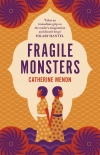Fragile Monsters, Catherine Menon [free e books to read txt] 📗

- Author: Catherine Menon
Book online «Fragile Monsters, Catherine Menon [free e books to read txt] 📗». Author Catherine Menon
I know this plait of hair, although Ammuma never showed it to me even on her saddest days. It explains a lot, for its size. Why Ammuma might still be buying gifts for a long-vanished four-year-old daughter. How she must have felt, the night she cut that daughter’s hair off, and what the alternative might have been. Which is to say, not much of one at all.
20. The Princess Lost: 1941
The birth of Mary’s daughter was difficult, as first births generally are. Mary was alone in the echoing and expensive house in Ipoh except for an indifferent midwife. But then, she’d been alone nearly every day since moving to Ipoh. Rajan spent all hours working in the general hospital, and Mary herself had always found it hard to make friends.
So it was the midwife who helped her crawl between the bed and the marble floor, who held her hand through the pains. There weren’t any aunties or grandmothers or quiet, caring friends. When Francesca opened her eyes on the world for the first time, it held nothing but her mother.
The next three years were hard ones for Mary. Rajan plunged eyebrows-deep into political scheming, bringing home firebrand friends and conspirators well into the small hours. These friends squatted out on the marble verandah – Mary’d moved up in the world; she had a marble verandah instead of a concrete one, she drank her tea out of a bone-china cup and wasn’t a bit grateful for it. The friends smoked on that verandah and muttered out of the corners of their mouths. War, these friends muttered, and Japan and more and more they muttered invasion.
And then, before Mary knows it, it’s 1941. Francesca’s three years old with a charming lisp and two dimples in her chin and a howl that can stand plates on end. And those plates are empty, more often than not. Rice is rationed these days, as is milk and salt. Mary has very little spare to feed Rajan’s friends but they’re not, by now, the type of men to sit around a dining table. A few of the more cautious ones have already sent their wives to Australia or India or even Singapore, which is impregnable and which will never, ever fall. Occasionally the visitors include a few British soldiers, grim and over-clean men who make three-year-old Francesca cry and wriggle in Mary’s arms at the sight of their pale skin.
‘What a good thing you never met your grandfather,’ Mary tells her daughter, thinking of Stephen’s blustery red face. Stephen would never have approved of such a rebellious girl-child; didn’t approve, in fact, when he had one.
Mary hasn’t seen her parents since the wedding. She’s exchanged letters, of course, the sort of buttoned-up, good penmanship letters that don’t say anything at all. Her father’s replies – Radhika, by now, is too far gone in betel-nut dreams to do anything so mundane as write to her daughter – talk about the weather. The expected rain. The expected heat. These letters are so bloodless, so lacking in muscle, that Mary’s almost surprised to find the paper doesn’t turn blank as soon as she’s read them. Francesca will have more love than that, she resolves, and hugs her daughter tight.
‘Come on, Fran,’ she says. ‘Leave your father in peace now.’
Truth be told, Rajan is playing an even more dangerous game these days than Mary knows. It isn’t just old friends he’s inviting into his house. He’s inviting single-minded, single-eyed men agitating for Indian independence; he’s inviting disaffected Malays who want their sultans back in Malay palaces and their rice paddies back in Malay hands. He’s even on occasion invited a few meek and unthreatening Japanese men: a photographer, or a barber or a dentist. Harmless men, he would say, but no matter. Collaboration will, in any case, soon stop being a choice.
So when the rumble of planes overhead increases in frequency, when exploratory bombs start to be dropped over Ipoh and leaflets tumble down in every language known to man, Rajan’s been expecting it. The general hospital has already started discharging patients in preparation for war casualties and the streets around are filled with one-legged men, with women recovering from hysterectomies and children with skin complaints. Mary goes about with pans of what little rice she can spare, and worries that Francesca will catch something awful from her new and leprous playmates.
Mary’s looking thin and haggard these days, wearing herself out with war preparations. She stalks through the streets during trial blackouts, tutting over the tiniest chink of light and knocking at houses where hurricane lamps still glimmer. There aren’t many of these houses, in fact, because half of Ipoh is doing the same and when one night the trial blackout is interrupted by a glorious mass of fireflies bursting into light in a nearby orchard, the brilliant streets are found to be packed with scurrying, scolding women.
But when the Japanese finally land at Kota Bharu at the end of 1941, all that preparation and worry become worthless. The British run, fleeing in their hundreds in cars and lorries. And it’s not just the British running; it’s Chinese, who know which way the wind is blowing, and Indians, who can sniff trouble from a mile away. One by one they slip into paddy fields with all their worldly goods tied to their backs, planning to live out the next few months in the





Comments (0)